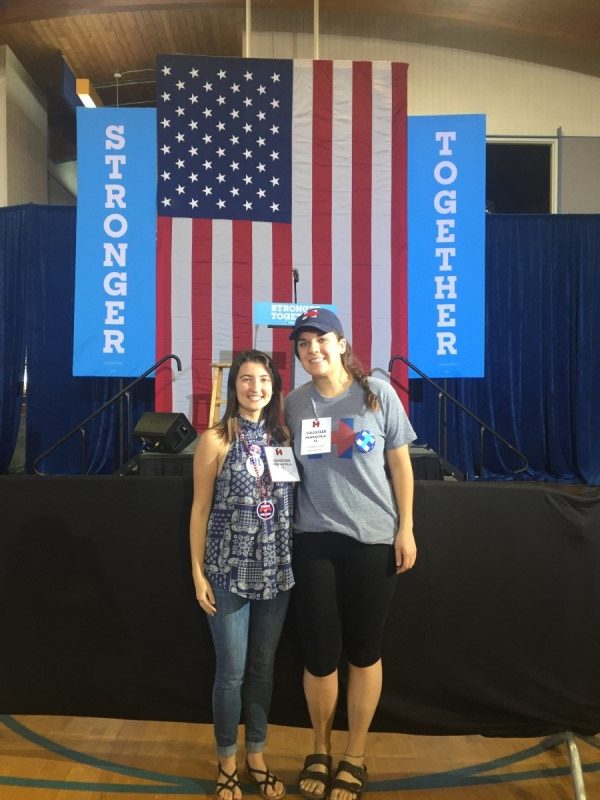Students aim to create change through political involvement
Courtesy of Lucy Murray
Freshman Lucy Murray and Junior Jillian Singer volunteer for Hillary Clinton in Pensacola, Florida.
From national campaign trails to nonprofit offices, Tulane students are effecting change through a variety of political avenues, and their impact can be felt far beyond the Tulane community.
The 2016 election rallied many politically active students, providing a chance for them to gather behind candidates, issues and ideas.
Freshman Lucy Murray worked as a fellow for the Hillary Clinton presidential campaign last fall. She worked with the state campaign director phonebanking and organizing volunteer efforts. Murray decided to dedicate herself to this work due to her passionate support of Clinton and her desire to see a woman in the White House.
“I supported Hillary Clinton because she was a strong female candidate who did what she thought was right, no matter what the consequences,” Murray said. “She stood for progress for the Democratic Party and had the political prowess to accomplish many things.”
As an aspiring politician, Murray saw this fellowship both as an opportunity to test the waters of political work and impact change for the national Democrat platform.
Other students focused on local politics as a means to enact change. Undergraduate Student Government Senator Josh Rosenbaum organized students to canvas for Senate candidate Foster Campbell in a runoff election against current Senator John Kennedy.
“It was incredible to see so many people turn out to support a good Louisianian candidate,” Rosenbaum said. “[I]t might not have had the … appeal of a presidential race, but so much change happens on the state and local level …”
Rosenbaum was motivated by the specific issues the Campbell campaign championed, including raising the minimum wage, equal pay for equal work, expanded access to health care and addressing climate change.
“… [M]ost importantly … he was the only major candidate in that huge field to say that both climate change is created by human activity and that we need to holding oil companies — in Louisiana especially — accountable for the damage they’re doing to the environment,” Rosenbaum said.
Other students became involved in other causes without working on a political campaign.
Last summer, senior Nate Fowler interned for a non-profit that focuses on Haitians’ human rights. He is currently interning with the American Civil Liberties Union and an anti-poverty lobbying organization called the Borgen Project.
Through these groups, Fowler has been responsible for speaking with politicians around the country about a variety of issues. Most recently, he is focusing his efforts on Louisiana representatives.
Though Fowler was involved in work facilitating a change in United Nations policy towards Haiti, he is sometimes skeptical that an individual can create significant impact.
“Since I’m not as active on campus, I think it’s harder for me to see that kind of change because I’m attaching myself to movements … so large that it can be very hard to see direct change.”
Women in Politics Vice President Olivia Butler finds that the best way to be politically active is to simply speak out and to be a part of the conversation. Along with 55 other Tulane students, Butler attended the Women’s March on Washington. Even though she was only one of hundreds of thousands of attendees, Butler felt that the size of the march was empowering.
“… [I]f you have the ability to share what you’re thinking, to share what you’re passionate about, that is most important in getting involved … if you have the privilege to talk about what matters without repercussion or harm, then it’s your duty to do that.”
Tulane College Republicans did not respond to requests for interviews by the time of this article’s publication.
Your donation will support the student journalists of Tulane University. Your contribution will allow us to purchase equipment and cover our annual website hosting costs.





Leave a Comment